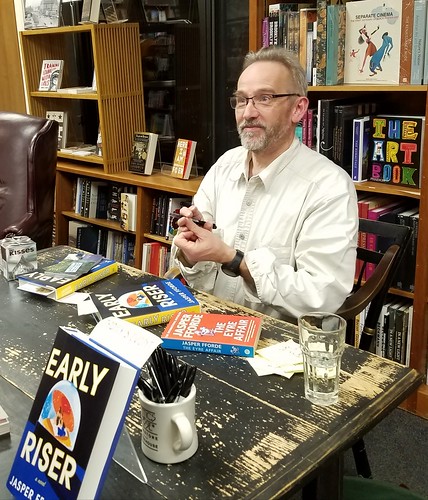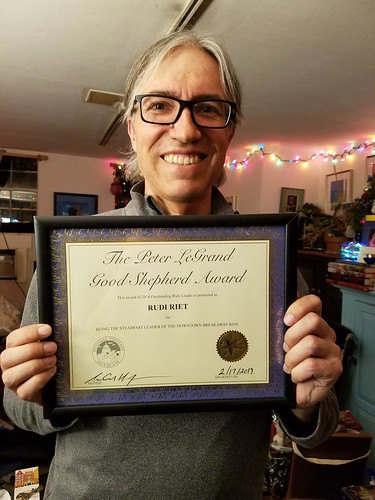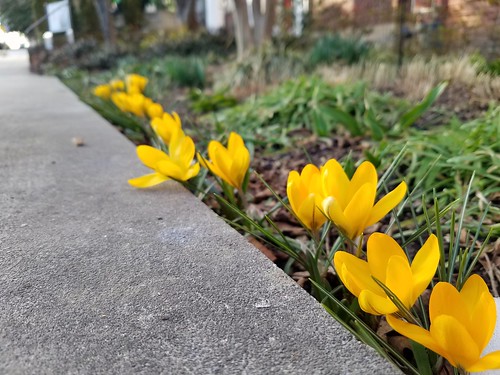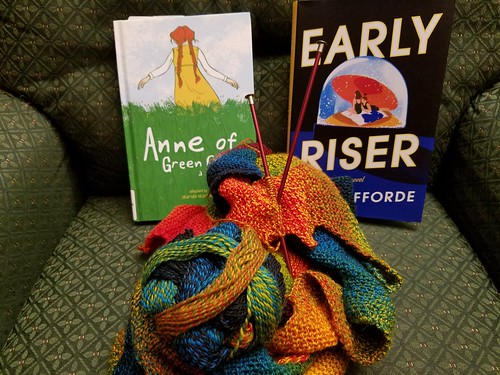February 22, 2019
launch, outstanding, spring!, and blitz torte
posted by soe 1:23 am
Three beautiful things from the week after my birthday:

1. I headed up to Politics and Prose on Monday for the American launch of Jasper Fforde’s new book, Early Riser. He was hilarious, as always, warning us that while all his previous books had taken approximately 120 days to write this one had taken 600. “Unfortunately, it is not six times better than my previous books.”

2. Rudi learned Sunday night that he’d been honored at his bicycle club’s annual meeting (which he’d had to miss because of his ski coaching obligations) with the Peter LeGrand Good Shepherd Award for being an outstanding ride leader. Apparently he was nominated by 14 members of the club for his weekly spring/summer ride and for being both fair and “a hardass.” (He leads a popular multi-level ride through northwest D.C. and nearby Maryland during the tail end of the evening rush hour, so he sets and enforces really strict rules about how participants should behave on the road.)

3. I was so caught up in the daffodil watch that I didn’t notice we’d had some other bulbs bloom in the neighborhood this week. (Heading to Georgetown this weekend to check out Book Hill…)

And a bonus, just because:
4. My (belated) birthday cake turned out great (I added a drop of food coloring to the filling to make it pink to play up the Valentine’s connection):

How about you? What’s been beautiful in your world lately?
February 21, 2019
mid-february unraveling
posted by soe 1:13 am

I think it was very nice of Jasper Fforde to publish a book to match my shawl-in-progress. I suspect I will be done with the book first, because I am nearly certain I have enough yarn to eke out a seventh strip so am going to go for it.
I am also reading this graphic novel adaptation of Anne of Green Gables, done by Mariah Marsden and Brenna Thummler. The illustrations are amusing and they manage to include most of the phrases we all love, but it’s missing the flavor of the original text. But it also moves really quickly. I only started it last night, but am already to the scene where they jump on Aunt Josephine.
I’m down to the last 45 minutes of The Woman Who Smashed Codes. World War II is over and William and Elizebeth are trying to figure out how to proceed with their lives during peacetime. He doesn’t die until 1969, so they’ve got some time to enjoy each other’s company. I hope they’re able to do that…
Head to As Kat Knits to see what else folks are reading and crafting.
February 20, 2019
top ten tuesday: unloved books you should read
posted by soe 1:08 am
Today’s Top Ten Tuesday topic at That Artsy Reader Girl asks us to promote books we’ve loved that need more readers. Specifically, we’re asked about books that have fewer than 2,000 readers on our review site of choice. According to Goodreads, I’ve read nearly 200 books that fall into that category.
Here are ten of them that I’ve enjoyed quite a bit (with the current number of ratings noted):
- Crazy ’08: How a Cast of Cranks, Rogues, Boneheads, and Magnates Created the Greatest Year in Baseball History by Cait Murphy (1,852 rankings): This history looked at the 1908 baseball season and ranked third on my list of favorite books way back in 2007.
- The Birds’ Christmas Carol by Kate Douglas Wiggin (1,145): This is one of those sentimental reads of mine. By the author of Rebecca of Sunnybrook Farm, this Victorian picture book focuses on the too-good-to-live Carol Bird who wants pleads with her family that her Christmas wish is to share her Dec. 25th birthday with the brood of poor children who live next door. It’s overly sentimental, bordering on mawkish, predictable for its time, and guaranteed to make you bawl. Sometimes you need that in a holiday read, though.
- Come Hell or Highball by Maia Chance (1,223): Where are my mystery lovers at?! This series is set in Prohibition Era New York and centers around the recently widowed Lola Woodby who discovers the day they bury her philandering husband that he was in debt up to his eyeballs and that their estate has been entailed to his health doctor younger brother. Desperate to avoid having to move home with her parents, she escapes to her late husband’s paramour nest in the City with her Swedish cook, Berta, where, inspired by their shared love of a particular potboiler series, they decide to become detectives for highbrow society. This is the first novel in the Discreet Retrieval Agency series, and you should really read it.
- The Harlem Charade by Natasha Anastasia Tarpley (624): You all know I love a good heist novel. Here’s one set in a middle-grade novel that will also give you some information on the Harlem Renaissance and the Studio Museum in Harlem. Its protagonists are two classmates working on a class project, one the Korean granddaughter of bodega owners and the other the white daughter of a wealthy developer who gives away food and metro cards to the needy, and the grandson of a Black man attacked in their neighborhood, who is now living on the street to avoid getting picked up by DCFS. As they seek to discover the cause of the attack on Elvin’s grandfather, the trail leads them to a decades-old art mystery and the way to save their neighborhood from being bulldozed.
- The Last Fifth Grade of Emerson Elementary by Laura Shovan (1,178): On the first day of 5th grade, a teacher informs her students they’re going to write a poem every day in class. This Cybils-winning verse novel shares a selection from each of the 18 students over the course of a tumultuous year of change and activism. Magnificently, Shovan succeeds in giving each kid enough of a distinct voice that you get so you can recognize a poem’s author without checking first.
- If God Invented Baseball by E. Ethelbert Miller (14): I wasn’t going to include 2018 publications in this list, because it seems like it’s not unreasonable that they haven’t gotten the readership of other books yet. But with only 14 rankings of this stellar collection from a renowned D.C. journalist and poet, I had to make an exception. He writes about baseball as a metaphor and baseball as baseball from the early glory days to the contemporary game and exalts in all the things that make baseball great — that it is completely and utterly human — something I wish the commissioner’s office and tv execs would keep in mind.
- Girl Detective by R.A. Spratt (903): I can only assume this middle-grade girl detective series hasn’t caught on because it’s Australian and thus hasn’t gotten the marketing for books written in the U.S. or Canada. Its protagonist, Friday Barnes, is a Sherlockian thinker who uses reward money from solving a bank heist to send herself to a boarding school, where she sets to unraveling mysteries for her classmates.
- A Properly Unhaunted Place by William Alexander (231): Rosa Ramona D├â┬şaz and her ghost-appeasing mother have just moved to the library’s basement apartment in the only town in America where no spirits live. Rosa, irritated by her mother’s choice and missing her father, makes friends with Jasper Chevalier, whose parents run the local Ren Faire. When ghosts seem to descend upon the fair, she is able to fight them off, but there’s trouble afoot, and she is the only one who knows enough to be able to stop it. Apparently a sequel to this middle-grade ghost novel is in the works!
- Honest Engine by Kyle Dargan (41): When I read this collection of poems about loss back in 2016, I promoted it as “running the gamut from the State of the Union to sleep deprivation to a dozen or so poems about loved ones gone from this earth, with a surprising amount of science fiction fandom thrown in for good measure.” Apparently that’s a big sell, but I hope the verse lovers among you will seek out this volume from one of D.C.’s poets.
- Storybook Travels: From Eloise’s New York to Harry Potter’s London, Visits to 30 of the Best-Loved Landmarks in Children’s Literature by Colleen Dunn Bates and Susan La Tempa (48): Let’s be honest. One of the great things about reading is that you get to travel places near and far without cost or trouble. But sometimes, wouldn’t you like to experience the settings yourself? If children’s and middle grade novels are one of your true loves, this is the travel guide for you. It offered up ideas for books I’ve read and those I haven’t yet had the pleasure of yet, so consider glancing at it if you’re planning — or dreaming of — a vacation.
Honorable mentions go to Diamond Ruby by Joseph Wallace, The Collected Prose of Elizabeth Bishop, 101 Two-Letter Words by Stephin Merritt (with illustrations by Roz Chast), and James Thurber’s The White Deer.
What less-popular works do you recommend?
February 19, 2019
nearly there (ii)
posted by soe 2:05 am

Gramma used to think, not incorrectly, that sometimes my head got in my way. You just can’t do things the easy way, can you, she’d ask. Often this isn’t true, except when it utterly is.
I’ve been hankering after her Blitz torte, which is a two-layer, meringue-topped cake with pineapple and cream filling, something she used to make quite frequently and which I haven’t had since, I think, before she went to live with my folks. It’s been a long time. I have the recipe for it, though, so I decided that this year I was going to make a birthday cake and that that was going to be it.
There are a few minor causes for concern to that plan. I have never successfully made meringue. I don’t especially like to follow directions exactly. I don’t have two cake pans of the same size.
While I knew I could wash and reuse my one round cake pan, I decided instead that I had these heart-shaped mini cake pans Karen gave to me years ago and that they were probably together roughly the same size as what was called for in the recipe. Never mind that this was going to make it far more challenging to remove each piece from the pan intact. I’d decided this was the best way to go, and we were going this way.
I ended up not making the cake last week for a couple reasons, but ultimately this was a good thing, I think. Instead, I embarked upon it this afternoon and finished it up tonight.
I separated nearly twice as many eggs as the recipe called for, first because one egg was bad and I hadn’t been pouring the egg whites into a fresh container from the one I was separating them over, so I lost two egg whites when the third was bad. Another I broke the yolk when I cracked the egg. (The two spare yolks and the broken egg went into the fridge for use another day.) I’d originally intended to whip the egg whites first using my Kitchen Aid beater attachment, but then I made the cake batter first and didn’t have the bowl available. So I had to whip the egg whites by hand. After half an hour of whisking, I didn’t have any peaks, let alone stiff ones, but it was definitely thicker, so I decided it was good enough.
Four-plus hours after embarking upon this baking journey, I have at least two loads of dishes to handwash, ten wonky cakelets (in which nine of them had the meringue topping separate from the cake when I attempted to get them out of the pans — why does meringue want to stick to everything except the cake itself?!), and still no cake. Tomorrow afternoon I’ll make the filling using the cream I had to buy after we discovered my older cream had clotted (I’ll make scones).
There were tears earlier, so it’s good I didn’t try to make this on my birthday. God, I hope it tastes okay. I’ll have put six hours into this damn thing before we ever get a bite…
I could have done things the easy way, but then it wouldn’t have been my way, would it?
Now pardon me while I go put a dent in those dishes…
February 18, 2019
into the stacks 2019: february, part 1
posted by soe 1:51 am
I only finished one book in the first half of the month, so this will be short. (I’d expect a bunch for the end of February.)
The Emissary, by Y├ů┬Źko Tawada (Translated by Margaret Mitsutani)
Set in Tokyo at some point in the middle-distance future, the rather loose story focuses on Yoshiro, a spry centenarian and former novelist, and the delicate great-grandson, Mumei, he is raising on his own. A great catastrophe — a radioactive one we are meant to understand — occurred a generation ago or so, causing Japan to close up its physical and metaphoric borders and create a dystopian, isolationist society in which foreign words — and concepts — are forbidden and the elderly do not seem to die (they now have three categories for senior citizens that include “young elderly,” which starts when you reach your 80s) or really even especially weaken (Yoshiro jogs daily, for instance, and his daughter works in an orchard picking oranges). Children, on the other hand, are so weak and constantly ill that they have difficulty eating, that doctors secret away their official medical reports and that parents are told to stop taking their children’s temperatures because they are always running fevers and it just depresses everyone. Mumei, despite all the suffering he seems to undergo simply by existing, is a rather philosophical child, with deep thoughts and a placid demeanor.
Most of the story is told from Yoshiro’s perspective, focusing on how life has changed and how much he worries about his great-grandson. A few chapters are told from his estranged wife’s perspective, when she comes for a rare visit from her school for children whose parents have moved elsewhere in Japan to work. A couple more are told from Mumei’s teacher’s point of view, as he considers language, the globe, and how the fragile children in his class interact with each other. And most of the final chapters in the book are from a teenaged Mumei’s perspective, as he navigates life from his wheelchair and prepares for an adventure. Each of these four characters will consider the importance of an emissary in one way or another.
You may remember that I partially picked up this slim novella because it had won the National Book Award for Translated Literature and also because its blurb suggested it was going to be a lot of fun. It’s possible I missed something, but I did not find the book “delightful, irrepressibly funny,” or “playfully joyous,” and it was really hard to separate the reality from that overbilling. I will say that the author and her translator clearly love and respect language greatly, as it’s a recurring theme in the work and that she has a reasonable concern for what the globe will look like in a few decades, regardless of whether there’s a nuclear meltdown, given the disaster-level scenario climate change is likely to wreak. So, a fair assessment of The Emissary is that it gives you a lot to think about, particularly given its length, but none of it is playful or fun.
Pages: 138. Library copy.
February 17, 2019
nearly there now
posted by soe 1:37 am

Tomorrow would be my guess, but maybe Monday if the sun doesn’t come out until then…







